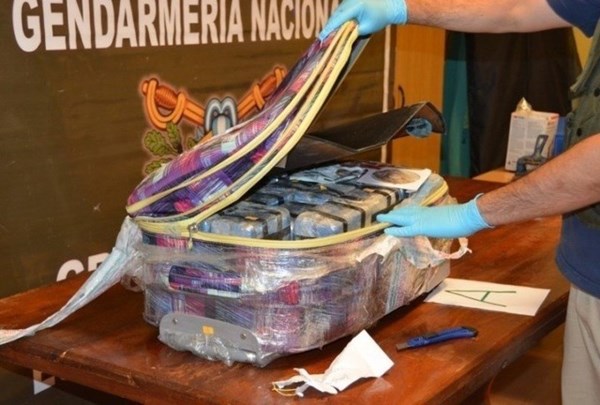Media: Cocaine smuggled through Russian embassy was brought from Argentina to Russia on government aircraft
The plane that was loaded with suitcases of cocaine in Argentina had the same hull number as an Il-96 airliner that is part of the Russia Special Flight Detachment which serves Russian senior officials, RBC news agency reports.
At the end of the operation to clamp down on the drugs supply channel from Argentina to Russia, the Argentine Gendarmerie published a photograph and a video on Twitter. These show the aircraft’s hull number – 96023. An airliner with the same number became part of the Russia Special Flight Detachment in August 2016, and was in Buenos Aires in December 2017, according to information from russianplanes.net.
The Russia Special Flight Detachment told RBC that the information on the plane’s hull number and routes is incorrect.
According to Argentine National Security Minister Patricia Bullrich, in December 2017 the suitcases which the channel organizers believed contained cocaine were sent “as diplomatic luggage on a Russian government aircraft”. The Telegraph wrote that the operation made use of the plane of Russian Security Council Secretary Nikolai Patrushev, but sources in the Russian Security Council later responded that this claim was “somebody’s imagination and a fake”.
The joint anti-narcotic operation between the law enforcement agencies of Argentina and Russia was the outcome of an investigation that began in December 2016, when the Russian ambassador Viktor Koronelli contacted the Argentine intelligence agency after finding 12 suitcases containing 389 kg of cocaine in one of the schoolrooms at the Russian embassy. The cocaine was worth an estimated €50 million. As part of the investigate operation, the narcotics were replaced with flour and the briefcases were equipped with GPS tracking devices.
In November 2017, a criminal case was initiated in Russia according to the articles “Production, sales or transmission of narcotics on a particularly large scale” and “Trafficking narcotics on a particularly large scale”. In December 2017, three suspects were arrested – Vladimir Kalmykov, Ishtimir Khudzhamov and Ali Abyanov.
Another defendant in the case – the German businessman Andrei Kovalchuk – was arrested in absentia by the Moscow Court in January 2018, and placed on the international wanted list. On February 26, the FSB reported that the organizer of the cocaine operation was hiding in Germany, but did not mention his name.
